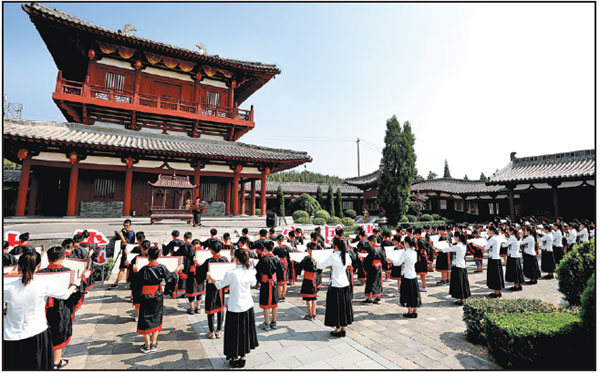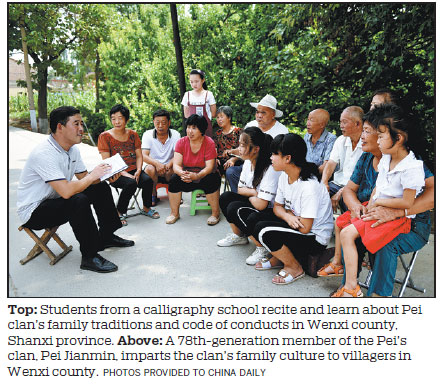Clan of achievers
The Pei ancestral hall in a Shanxi village tells the remarkable story of a family and its accomplishments, Yang Feiyue and Sun Ruisheng report.
An unassuming ancestral hall continues to attract visitors from far and wide thanks to its glorious history and inspiring setting.
There are no magnificent pavilions, winding galleries or lush greenery to greet visitors when they enter the iron gates to the Pei ancestral hall in Peibai village, Wenxi county, in northern Shanxi province.
While the quiet courtyard seems unremarkable at first glance, a sense of grandeur develops when visitors catch a glimpse of the inscribed portraits of historical figures across the square.
The Pei ancestral hall was built during the Tang Dynasty (618-907) by the offspring of the Pei clan to worship their ancestors - many of whom had left their mark on ancient Chinese history.
Having produced 59 prime ministers and 59 senior generals since the Qin Dynasty (221-206 BC), around 500 members of the Pei clan have become well-known writers, artists, scholars and scientists.
Their achievements in politics, economics, the military and diplomacy have elevated the Pei clan above scores of their counterparts.
"The Pei ancestral hall sits by a mountain and river, and enjoys magnificent views," says Pei Jianmin, one of the 78th generation of the Pei family clan.
The 42-year-old has been working at the hall since 1995.
Pei Jianmin developed a keen interest in studying the Pei family history since a young age.
"The ancestral hall mainly serves as a place to worship our ancestors and remind us to stay loyal to our family," he says.
In ancient times, major village and educational affairs were conducted at the hall, too.
The hall was a grand palace which was restored during the Ming Dynasty (1368-1644), Pei Jianmin adds.
However, some of the buildings were destroyed during the wars of the 1940s, along with many of the precious inscribed tablets and delicate wood carvings.
Things began to pick up in 1975, when the local government decided to build five houses on the ruins of the original site.
"The hall still has some precious antiques and stone tablets," Pei Jianmin says. In particular, the Peihong tablet carries a history of more than 1,400 years.
These stone tablets are considered by experts to have great historical value and for students of calligraphy.
In 1995, the Wenxi county government decided to develop Peibai village into a cultural and tourism destination by tapping into the hall's ancient heritage.
It had 59 steps built to lead up to the existing hall, to symbolize the 59 prime ministers from the clan, Pei Jianmin says.
Walls were also constructed and tablets inscribed with the names of the outstanding ancestors of the Pei clan, and a memorial hall was also established.
Now visitors are able to learn more about the prominent Pei ancestors, such as Pei Xiu, one of the most outstanding cartographers from the Western Jin Dynasty (265-316); Pei Ji, the first prime minister of the Tang Dynasty; and Pei Xingjian, a Tang Dynasty general who put an end to a rebellion by an ancient tribal people known as the Tujue.
The feats of the Pei ancestors have also given rise to a distinctive clan culture.
The Pei clan has a family code that consists of 12 dos and 10 don'ts. These were written in a terse form of traditional Chinese and have been passed down through the generations since the Tang Dynasty, when Pei Du, a prime minister, returned to the village and became a strong advocate for introducing education.
There is a room dedicated to housing these pearls of wisdom that keep the Pei family on the straight and narrow.
The family rules hammer home to Pei offspring the importance of such virtues as respecting their ancestors and parents, maintaining good relations with neighbors, being honest and modest, remaining hardworking and thrifty, pursuing professional skills, and following a strong code of social ethics.
Many Pei people from far and wide come and visit the ancestral hall on the third day of the third month of the Chinese lunar calendar, which is said to be the birthday of the first Pei.
An ancestor-worship ceremony is also held every year in Peibai village.
Now, an increasing number of visitors come to learn about the family's lore.
Pei Jianmin attributes the hall's popularity to President Xi Jinping's advocacy of good family traditions.
Since then he has played a major role in explaining his clan's philosophy in simple terms to visitors from around the country and beyond.
Last year, the ancestral hall registered more than 80,000 visits.
"Many people come here to learn how to maintain an honest work ethic in business, in government or in private," he says.
Parents and children now form a considerable section of the visitor demographic.
"I encourage children to be independent, work hard and make good use of their talents," he adds.
The local authority has invited Tsinghua University's School of Architecture to draw up plans to reconstruct the ancestral hall to its original state.
"The original floor plan is available, and everything will be restored based on it," Pei Jianmin says.
In addition, elements encouraging patriotism, good conduct and education will be added, he says.
Contact the writer at yangfeiyue@chinadaily.com.cn


(China Daily Global 08/13/2019 page15)


















